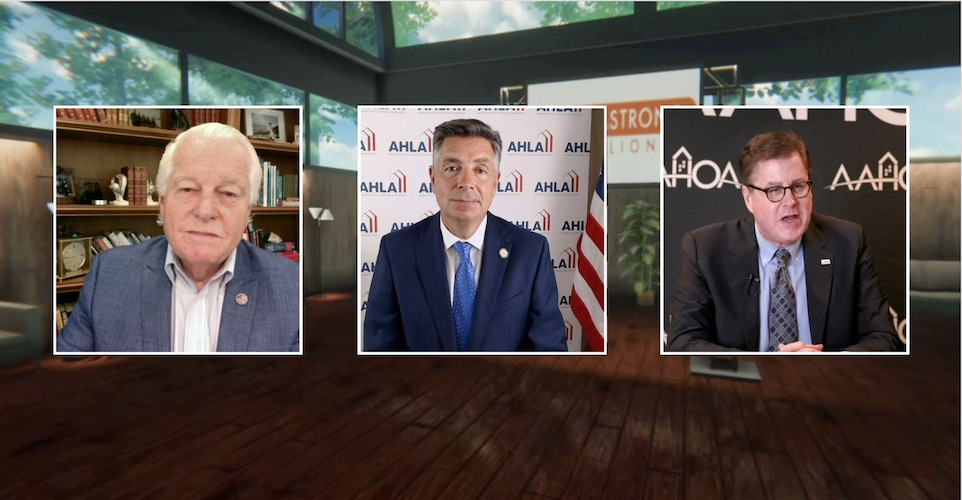
Kicking off day two of the 2020 AAHOA Virtual Convention & Trade Show, three CEOs of hospitality and travel associations reviewed legislation impacting the industry during the pandemic, the ongoing COVID-19 relief efforts to help hoteliers stay afloat through the crisis, and how their organizations are coming together to advocate for the industry. Cecil P. Staton, president and CEO of AAHOA, led the panel, which included Chip Rogers, president and CEO of AHLA, and Roger Dow, president and CEO of the U.S. Travel Association.
Staton began by reviewing some of the challenges hoteliers have faced and continue to navigate since the onset of COVID-19. “COVID, it seems, is the ultimate disruptor for our economy and for our industry. It’s changing how we travel, it’s changing how we go about our daily lives, and how hoteliers interact with guests and employees,” Staton said. “We’ve seen our income plummet, we’ve been forced to layoff more than half of our employees, and defaults and delinquencies are growing to record levels. Hoteliers face unprecedented uncertainty and are forging new paths in order to survive.”
Despite these hardships, Staton said that AAHOA members remain resilient, and are, “leaning on their associations in order to advocate for them—to ensure that they have the tools they need to bridge this crisis.”
Dow added that the past five months have been the most difficult time for the travel industry, citing that COVID-19’s effect on the industry is 10 times worse than the impact following September 11, 2001. “We’ll lose over $500 billion as an industry this year,” Dow said.
To weather this crisis and get the industry on a path to recovery, Dow reviewed several legislative priorities that the U.S. Travel Association is pushing, including expanding the Paycheck Protection Program (PPP) to include destination marketing organizations (DMOs), ensuring liability protection for hospitality businesses, increasing COVID-19 testing, expanding the employee tax credit, and providing Economic Development Administration (EDA) grants to hotels to promote health and safety.
Rogers outlined AHLA’s efforts to advocate for policies that help hoteliers stay afloat. “Right now, so many in our industry are just trying to keep the doors open and make sure that there’s a job for employees to come back to,” Rogers said. The PPP was among the most successful measures, Rogers explained, but the original legislation fell short of meeting hoteliers’ needs. The industry successfully advocated for a waiver so that hotel businesses with fewer than 500 employees per physical location would be eligible for PPP loans, expanding PPP eligibility from 62 percent of U.S. hotels to 98 percent. Now, Rogers added, AHLA is pushing for another round of PPP funding for businesses that have lost 35 percent or more of their revenue. “The current HEALS Act offers that at a 50-percent-or-more revenue loss,” Rogers explained.

Two other areas of COVID-19 relief that AHLA is pressing right now include pushing for hotel companies to be able to access the Main Street Lending Program and calling on Congress and the Administration to establish a Commercial Mortgage Backed Securities (CMBS) market relief fund for the hotel industry. “We know that about a third of all hotel debt is CMBS. We also know that about a quarter of all CMBS loans are in delinquency already. This is going to quickly be followed by foreclosure and is going to devastate our industry,” Rogers explained.
In addition, Rogers touched on unique issues at the state and local level, including liability protection for hoteliers and small businesses, which 10 states have signed into law, and local ordinances for health and safety guidelines developed in partnership with organized labor. Dow mentioned the impact of state-level travel restrictions on the industry, calling for nationwide consistency in reopening efforts to reduce traveler confusion. Staton added that another challenge for hoteliers is property taxes at the state level, for which AAHOA is advocating federal funding to potentially offset costs for state and local governments.
Rogers said that all of these efforts are stop-gap measures, and the ultimate solution to the industry’s crisis is for people to start traveling again and staying in hotels. Rogers explained that the U.S. Travel Association, in partnership with associations like AHLA and AAHOA, has been working to communicate the message that for those ready to travel, hotels are clean and safe, and AHLA, in partnership with AAHOA, has implemented industry-wide Safe Stay guidelines for hotels. “Even outside of the government action, the efforts to make sure that we’re sending that message that people can travel safely are critically important,” Rogers maintained. “The only way to solve this problem in the longterm is for people to get out and travel again, and the only way they’re going to travel again is if they feel safe. So it’s our job to continue… to send that message.”
Dow agreed, adding that research by the U.S. Travel Association found that 49 percent of people plan to take a trip that includes a hotel stay in the next couple of months. “It goes up to 60 percent if they know the right health and safety guidelines are there,” Dow said.
Staton made note of the hospitality industry’s proclivity to work together and leverage its strength in numbers to advocate for COVID-19 relief on both a local and national level. “One of the things that’s impressed me about this industry is how various associations representing different groups have come together and worked diligently during the pandemic to be an advocate together,” Staton said. “It’s been great to see that cooperation.”










